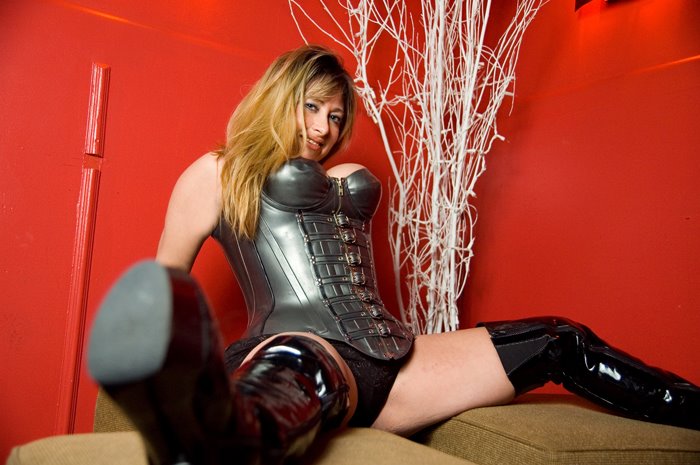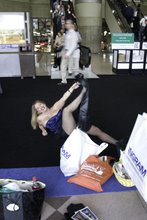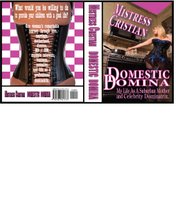In an exclusive television interview with The Associated Press, a woman who identified herself as Josef Fritzl's sister-in-law provided intimate details of the oppression inside the Fritzl home.
The woman, who has pictures of herself with the family, asked only to be identified as Christine R. to avoid public attention and throngs of journalists seeking interviews.
She said Fritzl's daughter Elisabeth ran away from home as a 17-year-old, about six months before police say she was locked into the soundproofed, windowless cellar beneath their apartment.
Christine R. also painted the most complete picture to date of her sister Rosemarie: a woman who against all odds fought to hold together a troubled family, yet never suspected that the cause of so much pain was in her own home.
"She never believed him capable of it," the woman said of her 68-year-old sister. "We spoke about it often when we met. And I would say, 'Rosemarie, where can Elisabeth be?' I even told her myself, she is definitely in a cult where you can only have a certain amount of children, or they don't want sick children."
But why was the cult story so easily accepted? And did Rosemarie search for her missing daughter? Such questions have puzzled Austrians, who have grappled with whether Rosemarie might have had knowledge of the crime.
Police say they have no evidence that Rosemarie was complicit in her husband's alleged atrocities. They say the 73-year-old electrician confessed to the imprisonment and rape and to incinerating the body of one of the children who died in infancy.
Christine R. described Josef Fritzl as a "tyrant" who instilled a culture of fear at home, which helped him create an elaborate cover story that no one questioned of Elisabeth running away to join a cult and abandoning three children on their doorstep.
"When he said it was black, it was black, even when it was 10 times white," said the woman, who was interviewed Saturday evening at her home in Austria. "He tolerated no dissent.
"Listen, if I myself was scared of him at a family party, and I did not feel confident to say anything in any form that could possibly offend him, then you can imagine how it must have been for a woman that spent so many years with him," she said.
Josef Fritzl is accused of concocting the cult story and even impersonating Elisabeth in a phone call to convince his wife of its truth. He is also accused of forcing his daughter to write letters that were used to explain the three children apparently found at their doorstep.
"We were all taken in by him," Christine R. said of her brother-in-law. "Every person that looked in his eyes was fooled by him."
She said Rosemarie frantically looked for Elisabeth. The sister, 12 years Rosemarie's junior, recalled searching for Elisabeth in train stations and where homeless people hang out.
"But where can you find out where these cults are?" the woman said. "We really did detective work all around as to where the cult could be."
Christine R. said her sister devoted her life to her children - a task that she focused on with even greater effort after her husband was jailed. "I believe he spent a year and half in prison," she said.
The Oberoesterreichische Nachrichten daily on Saturday printed an excerpt of what it said was a 1967 court record found in the state archives in Linz, in which a Josef F. was accused of breaking into the apartment of a 24-year-old nurse and raping her.
Police have declined to comment, saying records that old would have been erased under Austria's statutes of limitation. But authorities are awaiting old court records that the media say document the case. Christine R. said she did not have more information.
She said her sister reacted with "shock" but believed that "everyone makes a mistake" and focused on keeping her family healthy.
"I think this changed their relationship a little," Christine R. said. "You can surely imagine that a woman in such a situation would have been utterly broken and shocked over something like this."
As time went on, the relationship between Fritzl and his wife soured, the sister said.
"As far I know no sex took place in recent years," Christine R. said. "I believe it was because of his prior conviction, and because my sister had been getting bigger. And in any case he never liked fat women."
Still, Christine R. said there were no warning signs that something was disturbing about the relationship between the father and Elisabeth, whom police say may have been sexually abused when she was as young as 12.
"He was just as strict with her as he was to every other child," Christine R. said. "There was nothing in particular that could lead you to say he was more intimate with her. From the child as well it never came out. She never confided in anyone."
Authorities first began to unravel the complex story on April 19, when Elisabeth's eldest daughter was admitted to a hospital suffering from an unidentified infection.
Doctors, unable to find any medical records for the girl, appealed on TV for her mother to come forward. Fritzl then accompanied Elisabeth to the hospital April 26 and opened up to police.
Fritzl has not been formally charged. He faces up to 15 years in prison if he is ultimately convicted on rape charges, the most grave of his alleged offenses, unless prosecutors can charge him with "murder through failure to act" in connection with the death of the infant. That is punishable by up to 20 years in prison.
Christine R. said she last spoke to her sister "four or five days" after the daughter's admission to the hospital, which would mean about a day or two before Fritzl's arrest. She said she has received updates on the condition of her sister and Elisabeth from a "good source."
"My sister is apparently doing very badly and Elisabeth is not in the best shape either," she said. "I know my sister and when something is wrong with her children the world collapses.
Sunday, May 4, 2008
Subscribe to:
Post Comments (Atom)




No comments:
Post a Comment